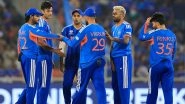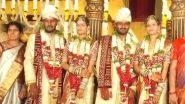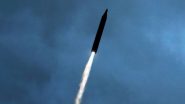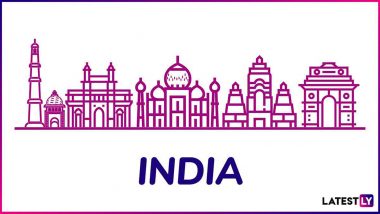Chandigarh, Feb 20 (PTI) A voter turnout of nearly 70 per cent was recorded till 5 pm in Punjab, where polling for 117 assembly seats was held on Sunday.
The final turnout figure at the end of polling at 6 pm is not yet available and officials here said that they are still compiling the data.
Also Read | Punjab Assembly Elections 2022: 65.50% Voter Turnout Recorded, Lower Than 2017.
The Punjab election office had released a polling percentage of 63.44 till 5 pm.
Later, at midnight, the Election Commission's Voter Turnout App released an updated percentage of 69.65 for polling till 5 pm.
Also Read | PM Narendra Modi Wishes Queen Elizabeth II Speedy Recovery After She Tests Positive for COVID-19.
Voting started at 8 am and continued till 6 pm and it remained peaceful, Punjab Chief Electoral Officer S Karuna Raju told PTI.
In the 2017 Punjab assembly polls, the voting percentage recorded was 77.4.
The percentage in 2002, 2007 and 2012 was 65.14, 75.45 and 78.20 respectively.
The Punjab CEO said 72 ballot units, 64 control units and 649 Voter Verifiable Paper Audit Trail (VVPATs) were replaced after they developed some technical snag.
The polled EVMs will be kept in designated strong rooms under round-the-clock surveillance of CCTV cameras, officials said.
Raju said that there was not a single case of disruption of polling.
On law and order, he said, "Some minor poll-related incidents were witnessed in the state and a total of 18 FIRs were registered on the day of polling to avert any untoward incidents."
This time a total of 1,304 candidates, including 93 women and two transgenders, are in the fray.
The Talwandi Sabo assembly segment recorded the highest turnout of 83.67 per cent while Amritsar West seat recorded the lowest at 50.10 per cent.
The percentage in assembly seats of Patiala, Amritsar East, Jalalabad, Lambi, Dhuri, Bhadaur and Chamkaur Sahib were, 62.10, 59.77, 80.10, 72, 78.89 and 70 respectively.
Mansa district recorded a maximum voter turnout of 77.21 per cent while Mohali recorded the lowest at 62.41 per cent.
Many districts falling in the Malwa region, which account for 69 of the total 117 assembly segments, recorded more than 65 per cent turnout.
It included Malerkotla at 72.84 per cent, Muktsar 76.95 per cent, Fazilka 73.59 per cent, Sangrur 73.82 per cent, Bathinda 74.99 per cent, Barnala 73.75 per cent, Fatehgarh Sahib 71.59 per cent, Faridkot 69.91 per cent, Ferozepur 67.30 per cent, Mohali 62.41 per cent, Rupnagar 70.48 per cent and Patiala 71 per cent. Moga and Ludhiana districts registered voter turnout of 67.43 per cent and 62.71 per cent respectively.
In the Majha region, Pathankot witnessed 67.72 per cent, Amritsar 62.71 per cent, Gurdaspur 70.62 per cent and Tarn Taran 63.03 per cent while in Doaba region, the voter turnout in SBS Nagar was 70.74 per cent, Hoshiarpur 66.19 per cent, Jalandhar 64.29 per cent and Kapurthala 67.87 per cent.
Prominent faces who were in the fray included Chief Minister Charanjit Singh Channi, Aam Aadmi Party's chief ministerial face Bhagwant Mann, Punjab Congress president Navjot Singh Sidhu, former CMs Amarinder Singh and Parkash Singh Badal, and Shiromani Akali Dal chief Sukhbir Singh Badal.
Former chief minister Rajinder Kaur Bhattal, Punjab BJP chief Ashwani Sharma and former Union minister Vijay Sampla were also in the fray.
Punjab witnessed a multi-cornered contest among the Congress, AAP, SAD-BSP, BJP-PLC-SAD (Sanyukt) and the Sanyukt Samaj Morcha (SSM), a political front of various farmer bodies.
The ruling Congress was seeking to retain the power while rival parties were eyeing to wrest power.
The Shiromani Akali Dal (SAD) contested the polls in alliance with the Bahujan Samaj Party (BSP).
The BJP fought the elections in alliance with Amarinder Singh-led Punjab Lok Congress and Sukhdev Singh Dhindsa-led SAD (Sanyukt).
The SSM contested the polls with Haryana Bharatiya Kisan Union (Chaduni) leader Gurnam Singh Chaduni-led Sanyukt Sangharsh Party.
On arrangements for voters, the CEO said pick-up and drop facility was provided to elderly people above 80 years and persons with disabilities (PwD). While arrangement for wheelchairs was also made for elderly people at polling stations, first-time voters were given certificates at the polling booths.
At the women-managed pink polling booths in the state, enthusiasm was seen among voters, especially those voting for the first time.
There were 196 pink polling stations for women while 70 polling stations are being managed by persons with disabilities (PwD).
Amritsar-based famous conjoined twins Sohan Singh and Mohan Singh, fondly known as Sohna-Mohna, cast their separate votes.
Sohna-Mohna had recently been handed over two separate electoral photo identity cards by Raju.
Both had turned 18 last year and voted for the first time.
The conjoined twins said they are extremely happy as both were able to exercise their voting rights.
Officials said the conjoined twins were treated as two separate voters.
The Election Commission restrained actor and philanthropist Sonu Sood from visiting polling booths in Moga following complaints that he was trying to influence voters.
His vehicle was also impounded by police, said officials.
However, Sood, who denied the charges, alleged that other candidates were trying to buy votes.
Sood's sister Malvika Sood Sachar is a Congress candidate from Moga.
In the morning, Charanjit Singh Channi paid obeisance at religious places at his home constituency Chamkaur Sahib. He claimed the Congress will get two-third majority in the polls.
After casting his vote, SAD patriarch Parkash Singh Badal said, "I am happy that our democracy is very strong. I will continue to serve my people till my last breath.”
SAD chief Sukhbir Badal said the SAD-BSP alliance will win over 80 seats.
In Patiala, former chief minister Amarinder Singh also exuded confidence of his victory.
AAP leader Raghav Chadha in his tweets alleged that at a polling booth in Guruharsahai, a sarpanch tried to influence voters. He claimed that some EVMs malfunctioned at Sanaour, Attari and Majitha. A total of 2,14,99,804 people, including 1,02,00,996 women, were eligible to vote.
There were 24,740 polling stations, of which 2,013 had been identified as critical while 2,952 were vulnerable.
(The above story is verified and authored by Press Trust of India (PTI) staff. PTI, India’s premier news agency, employs more than 400 journalists and 500 stringers to cover almost every district and small town in India.. The views appearing in the above post do not reflect the opinions of LatestLY)













 Quickly
Quickly


